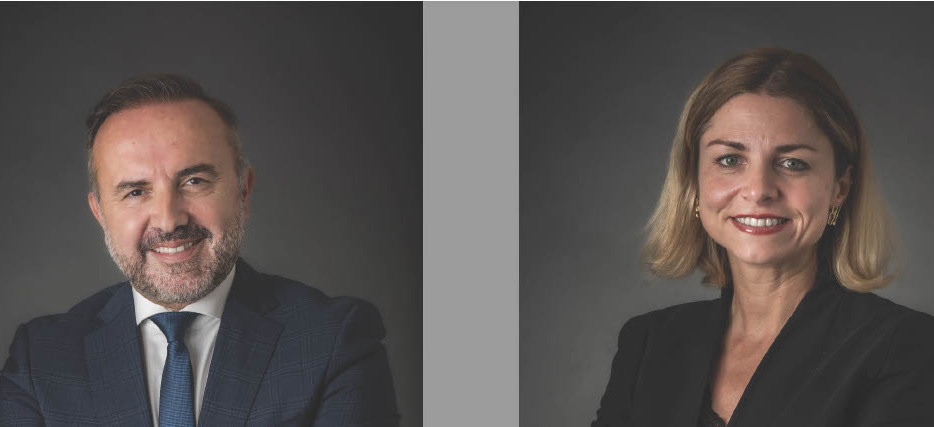
On the eve of the Monaco Yacht Show, we met with representatives from one of the most active banks in the yachting industry. Jérôme Audran, Deputy CEO of SG Monaco Retail Banking, and Adina Bates, Head of Yacht Finance at Societe Generale Private Banking Monaco, explain their development strategy in a rapidly evolving sector.
Jérôme Audran: From a corporate perspective, yachting is indeed a key sector in the Principality, with Monaco’s stated goal of becoming the world capital of yachting.
The number of players in this sector is estimated at nearly 300, including companies whose main activity is yacht rental or purchase/sale, but also a wider range of companies specialising in crew management, maintenance, design/architecture, fuel and provisioning, and concierge services, to name but a few.
SG Monaco supports Monaco-based yachting companies and professionals by offering them a personalised banking partnership with an in-depth understanding of the specificities of this niche market.
We have experts who are fully conversant with the challenges of yachting and its financial, regulatory and operational requirements. The bank supports its clients in a complex regulatory environment subject to increasing requirements, particularly in the fight against money laundering and terrorist financing. There is increased transparency and better communication between players on the management of their operations, supported by The Worldwide Yachting Association (MYBA), which brings together professionals in the sector and has contributed to the adoption of best practices in commercial contracts and high ethical standards.
SG Monaco is therefore establishing itself as a partner offering comprehensive expertise and global support, and aims to remain the leader in the Principality in this sector.
J.A: At SG Monaco, we offer a comprehensive range of banking services tailored to the specific needs of our professional clients in the industry. These services include: cash management and business accounts: day-to-day management of cash flows, optimised treasury services for international transactions, hedging operations; specialised financing: equipment loans, overdrafts; international payment services: facilitation of payments and collections in multiple currencies; risk management and insurance: solutions to cover risks related to the fleet, operations and liabilities specific to the maritime sector; digital solutions: secure telematic platforms enabling real-time monitoring of accounts and transactions.
However, let’s be realistic: this sector involves risks inherent to its cross-border nature and the multiplicity of parties involved in a transaction. That is why we have established specific criteria for this area, including the requirement that all financial flows pass through entities based in the Principality and that these flows, which are often international, be rigorously documented, while promoting collaboration with reputable yacht managers domiciled in Monaco.
J.A: Yachting clients do indeed require a personalised and multidimensional approach. Their needs revolve around an in-depth analysis of their profile and activity, with a detailed understanding of the profession and its specific operational characteristics. We also take into account mobility and the international dimension, including the assessment of needs for multi-currency services, fast and secure international payments, and the management of risks related to currency fluctuations.
This clientele also demands a high level of confidentiality and security, with the guarantee of enhanced discretion regarding transactions and personal data, which is essential for high-end clients. In addition, the implementation of advanced security measures ensures the protection of transactions and secure access to accounts.
Finally, personalised support and a high level of responsiveness are essential to meet the specific challenges of this sector. This requires the availability of a dedicated contact person, an expert in the field, capable of offering tailor-made solutions adapted to the needs of each client.
This comprehensive approach enables SG Monaco to offer a banking experience that is perfectly aligned with the specific expectations of yachting clients, thereby promoting their loyalty and satisfaction.

Adina BATES: First of all, we support a client or prospective client in a project that reflects a passion but also requires a certain investment and recurring future costs. One of the first criteria is therefore the consistency of the budget with the client’s profile, assets, cash flow and future needs. We are fortunate to be able to structure our financing in a sufficiently flexible manner to best meet these future needs.
The second, equally important criterion is the quality of the asset we are financing. The yacht remains our primary tangible guarantee. We have a pre-approval process for the shipyards we work with, based on factors such as reputation, the liquidity of certain brands and models, the robustness of value over time, and the financial strength of the manufacturer. This selection process protects both the bank as a creditor and the purchasing client. We currently work regularly with around fifteen shipyards, mainly in Europe, and can also consider new suppliers on a case-by-case basis.
In terms of our target market, we mainly finance motor yachts over 40 metres in length. The average size of the units already financed is around 70 metres. However, we do not have an upper limit.
A.B: We work with our customers as early as possible in the process, which is important for two reasons: In the case of acquisition, MYBA contracts take around two months to complete, and it is not common practice to include clauses suspending the contract pending the granting of financing. If the client wants us to finance their boat upon delivery, we have to work upstream on pre-selecting models, on-boarding and risk assessment.
In the case of construction, it is preferable to include provisions in the construction contract that allow the bank to be involved as a creditor. Even though shipyards are accustomed to these practices, a preliminary discussion allows each party to feel involved and considered.
In our financing techniques, we secure the transaction with a number of guarantees (mortgage during construction, financial guarantees, etc.). All the guarantees in the contract are potentially transferred to the bank. A client may prefer to negotiate one type of guarantee rather than another with the construction company, which may have an impact on the cost structure of the financing.
Finally, we also ensure that the tax and legal structure is consistent. We are generally open to many variations, as our clientele is very diverse. There are many market practices that we seek to understand by working with law firms in the relevant jurisdictions. We must have the flexibility to accept and the curiosity to understand, as long as it remains within a compliant and secure framework.
A.B: Our prospects reflect our client base and our areas of expertise. Traditionally European, with developments towards Asia, the Near and Middle East. On the other hand, a notable trend is that buyers are younger, around 45 years old, with profiles from the tech or finance sectors.
In terms of assets, explorer-type vessels are still popular, as they are highly autonomous and can sail to distant destinations, even around the world.
What are the specific legal or technical aspects of yacht financing that your clients absolutely need to know?
A.B: When purchasing a yacht over 40 metres, the client has generally already been in contact with the yachting world, either as a charter client or as the owner of a smaller vessel. The client is often quite knowledgeable about this environment, its players, its opportunities and its pitfalls.
However, when it comes to the actual financing techniques, there are no prerequisites. We always provide explanations, because financing an asset that depreciates in value by nature involves constraints that stem from banking legislation and complex guarantees. We want our clients to understand all the guarantees and their justification, how we structure our pricing and how we can sustain the relationship over time. Yacht financing is often just the beginning of a more comprehensive support relationship. This is important because it allows the client or their family office to be proactive.